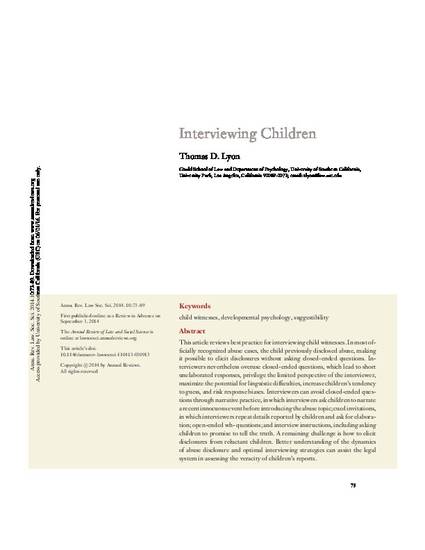
Article
35. Interviewing children.
Annual Review of Law and Social Science
(2014)
Abstract
This article reviews best practice for interviewing child witnesses. In most officially recognized abuse cases, the child previously disclosed abuse, making it possible to elicit disclosures without asking closed-ended questions. Interviewers nevertheless overuse closed-ended questions, which lead to short unelaborated responses, privilege the limited perspective of the interviewer, maximize the potential for linguistic difficulties, increase children’s tendency to guess, and risk response biases. Interviewers can avoid closed-ended questions through narrative practice, in which interviewers ask children to narrate a recent innocuous event before introducing the abuse topic; cued invitations, in which interviewers repeat details reported by children and ask for elaboration; open-ended wh- questions; and interview instructions, including asking children to promise to tell the truth. A remaining challenge is how to elicit disclosures from reluctant children. Better understanding of the dynamics of abuse disclosure and optimal interviewing strategies can assist the legal system in assessing the veracity of children’s reports.
Keywords
- child interviewing,
- child testimony,
- child abuse,
- child maltreatment,
- child witnesses,
- child neglect,
- child psychology
Disciplines
Publication Date
May 20, 2014
DOI
10.1146/annurev-lawsocsci-110413-030913
Citation Information
Lyon, T.D. (2014). Interviewing children. Annual Review of Law & Social Science, 10, 73-89.
